The Plymouth Antiquarian Society partnered with the Plymouth Bay Cultural District, Community Art Collaborative, and Plymouth’s Poet Laureate Stephan Delbos to create a new public art sculpture for the Plymouth waterfront. “Perseverance” is the second installation of the community-wide “In This Together” project. Unveiled on July 15, 2021, the sculpture will remain on the lawn of the Antiquarian Society’s Hedge House at 126 Water Street through November 2021.
This installation celebrates stories of perseverance from Plymouth’s past and present, featuring art created by local artists and students from Map Academy in Plymouth, as well as historic photographs, wallpaper, textiles, and documents from the Antiquarian Society’s collections. The honeycomb shape provided a template for the designs. Funding for this installation was provided by the Plymouth Bay Cultural District and the Mass Cultural Council Cultural District Initiative Grant.
Perseverance is persistence in striving for a goal despite difficulties, delays, or opposition. It is steadfastness in the face of adversity. The Plymoutheans whose stories we chose to highlight in this installation displayed determination and grit in extraordinary ways.
Prince Goodwin, Cato Howe, Quamony Quash & Plato Turner: Perseverance in Fighting for Freedom
Over 5,000 black soldiers fought for the cause of American independence. Parting Ways Cemetery on Plympton Road in Plymouth is the final resting place of four African-American Revolutionary War veterans: Prince Goodwin, Cato Howe, Quamony Quash, and Plato Turner. At least three, and possibly all four, had been slaves before the war. Quamony Quash fought in the Continental Army while still enslaved; he was not emancipated by Theophilus Cotton until 1781.
In 1792 the Town of Plymouth granted approximately 94 acres to the men for clearing the land at Parting Ways (named for the fork in the road leading from Plymouth to either Plympton or Carver). Despite the inhospitable conditions of the site, they created one of the earliest independent African-American communities in New England. Their graves are visible reminders of the New Guinea Settlement.
Click here for more information and a map to Parting Ways.
Plymouth Fragment Society: Perseverance in Helping Plymoutheans since 1818
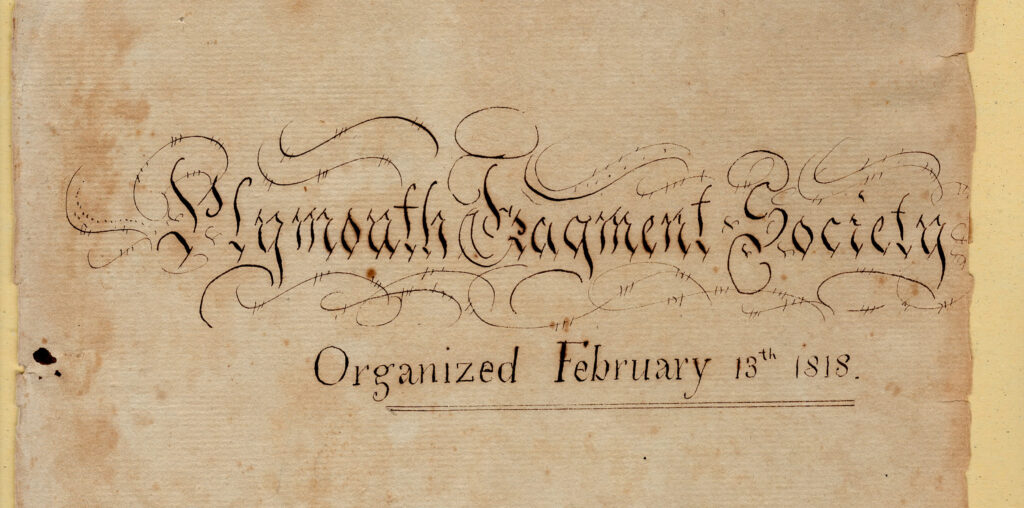
The Plymouth Fragment Society was founded on February 13, 1818 to aid individuals and families living in poverty in the Plymouth community. 183 women joined the organization in its first year to address the needs of their neighbors, inspired by the benevolent work of Swedish newcomer Marie de Verdier Turner, who arrived in Plymouth in 1812 as the young bride of Captain Lothrop Turner. The women sought to respond to the widespread distress caused by years of economic disruption due to the Embargo Act of 1807 and the War of 1812 in this New England maritime community. Plymouth’s Society may have been modeled after the Fragment Society of Boston, a women’s sewing circle founded in 1812 to clothe the destitute. Founded on Christian principles of charity, they derived their name from the New Testament story of the miracle of the loaves and fishes: after feeding five thousand people, Jesus told his disciples “to gather up the fragments that remained that nothing be lost.”
The women initially met together to sew garments for the poor from purchased or donated materials. They provided bedding, clothing, and shoes to those in need, and gradually expanded their operations to give additional aid, including milk, fuel, rent, and other necessary items requested via confidential application. They continued their work during times of prosperity and times of severe suffering, including the 1918 influenza pandemic and the Great Depression of the 1930s, when they partnered with the Unemployment Committee of the Town. The Fragment Society is still active today and remains one of the oldest continuously operating charitable organizations in the United States. They are respected within Plymouth for responding to the needs of the poor with generosity, compassion, and discretion.
Zilpha Harlow Spooner: Perseverance in Campaigning for Abolition & Women’s Suffrage
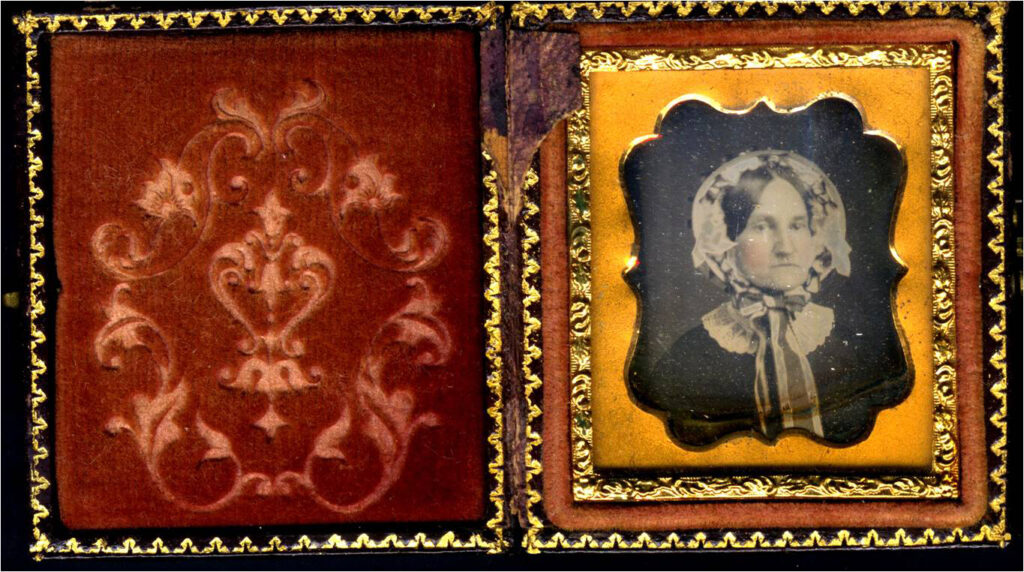
Zilpha Harlow Spooner (1818-1891) was born in Plymouth, the daughter of Ephraim Harlow and Ruth Sturtevant. Her father was a supporter of many of the reform movements shaping America in the 19th century, including anti-slavery and temperance. Following his example, Zilpha became a committed abolitionist and at a young age joined the Female Anti-Slavery Reading Society in Plymouth.
There were widespread protests against women who spoke boldly and “unnaturally” about controversial issues like slavery. Middle-class women were not supposed to step into the political sphere. Feeling the constraints placed on their activities due to their gender, many female abolitionists came together to advance another cause: women’s rights. 32-year-old Zilpha attended the first National Women’s Right’s Convention in Worcester in October 1850. Also in attendance was her future husband, Nathaniel Bourne Spooner. By her marriage to Nathaniel in 1851, Zilpha strengthened her connections to Plymouth’s most prominent antebellum reformers. Nathaniel was the eldest son of Bourne Spooner (1790-1870), Plymouth’s leading industrialist and founder of the Plymouth Cordage Company. Bourne was also a prominent supporter of the anti-slavery cause, and provided financial backing for the movement. Zilpha became acquainted with many prominent figures in the movement, including William Lloyd Garrison and Wendell Phillips.
After the Civil War, Zilpha turned her energy to the advancement of women’s rights. She was active in the Massachusetts Woman Suffrage Association and in 1870 she served on the committee that asked the Republican State Convention to support the woman suffrage cause. On November 24, 1873 Plymouth’s Woman Suffrage Political Club was formed. Julia Ward Howe and Lucy Stone, co-founders of the American Woman Suffrage Association, attended the assembly held in Davis Hall on Main Street with an audience of about 500. The Club began meeting regularly in the home of Zilpha and Nathaniel Spooner on North Street. Also in 1873, Zilpha served as a member to the Congress of Women held in New York City, which was attended by leading suffragists Elizabeth Cady Stanton, Sarah Grimke, and Lucy Stone.
In 1879 women in Massachusetts won the right to vote in school committee elections. Women who were not already taxpayers had to pay a poll tax in order to register to vote. By January 1880 56 Plymouth women – including Zilpha and her daughter Ruth – registered to participate in the spring election of school committee members. For the rest of her life Zilpha continued to campaign for full voting rights for women. She died 29 years before the ratification of the 19th Amendment in 1920.
Click here for a virtual tour highlighting women’s suffrage in Plymouth.
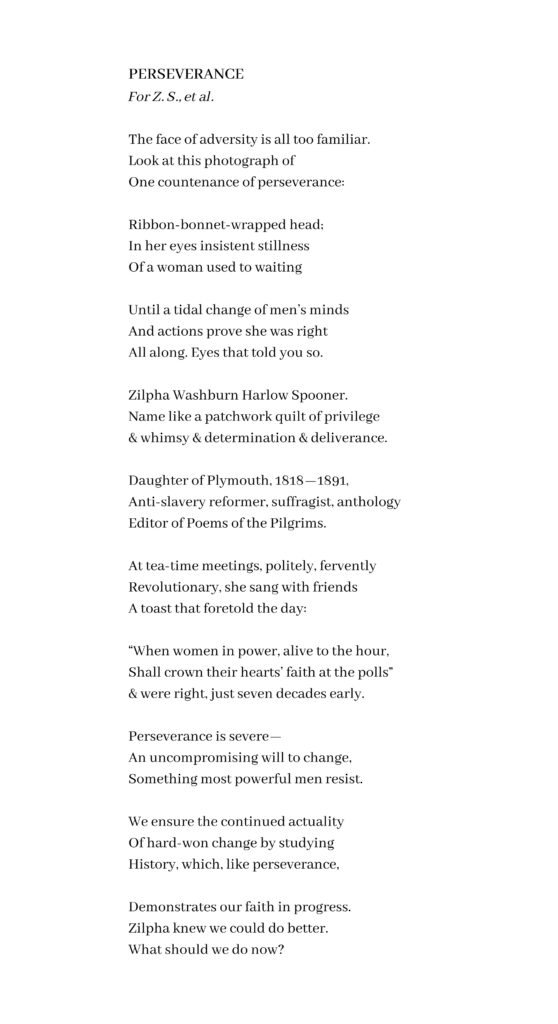
Plymouth Antiquarian Society: Perseverance in Preserving Plymouth’s Past since 1919
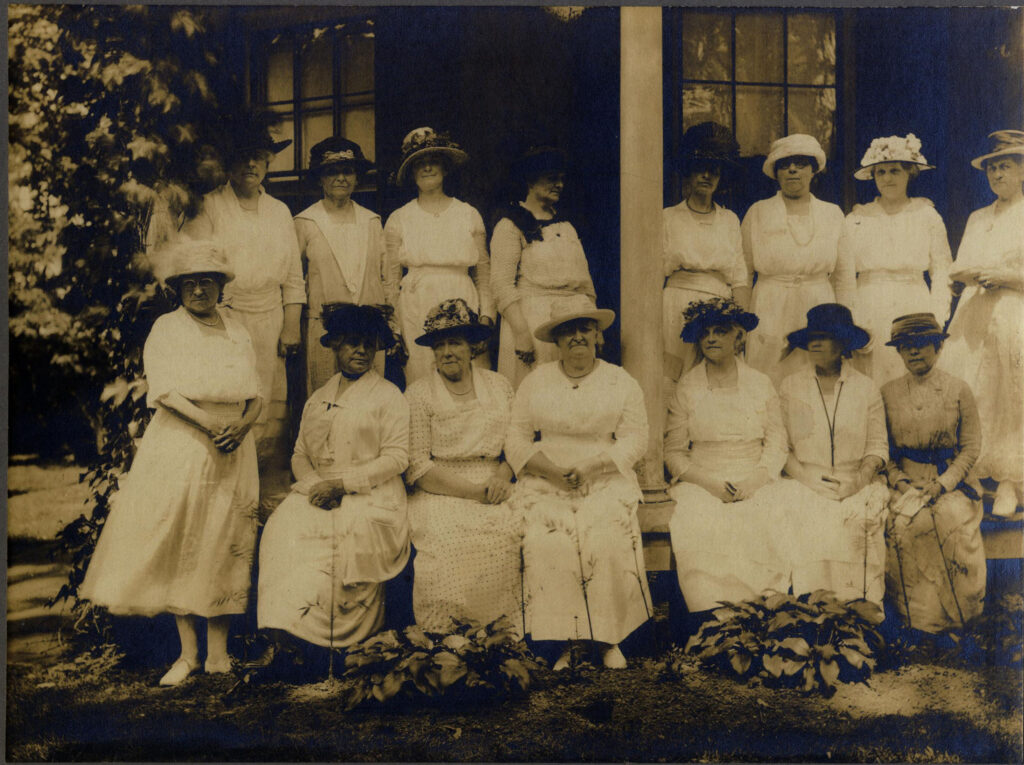
In 1919 the Town of Plymouth planned to demolish the historic Federal-style home at 83 Court Street, now known as the Hedge House, in order to build Memorial Hall on its site. A group of concerned women quickly mobilized to save the house, convinced that Plymouth was losing too many historic structures and erasing important links to the past. The women founded the Plymouth Antiquarian Society and incorporated on October 29, 1919.
The Society purchased the house from the town for $1.00, with the understanding that it would be moved when the town was ready to begin construction of Memorial Hall. They named it the Antiquarian House and furnished it with loans of furniture and china after it had been cleaned and painted. The Society opened the house in the summers of 1920, 1921, and 1922 for teas, card parties, and other fundraising events. Remarkably, by 1924 the Antiquarians had raised over $6,000 (approximately $96,000 today) to buy a lot on what is now Memorial Drive, put in a cellar and foundation, and move the house by horse power, turning it to face the harbor.
Undaunted by the responsibilities of preserving one historic house, the Antiquarians also acquired the Harlow House on Sandwich Street and the Spooner House on North Street. They developed innovative hands-on educational programs and created a significant collection of everyday artifacts and historic textiles. Now in its 102nd year, the Antiquarian Society continues to preserve and share Plymouth’s history.
Plymouth’s Immigrant Families: Perseverance in Working for the Future
The expansion of local industries in the 19th century required a workforce. Factory owners recruited immigrants to work in their mills producing textiles, shoes, rope, tacks, and other goods. They came first from Ireland and Germany, then later from Italy, Portugal, and beyond.
The leading employer was the Plymouth Cordage Company, founded in 1824 by Bourne Spooner. Employee housing in North Plymouth provided the foundation for a distinctive immigrant community. Industrial workers endured long hours and harsh conditions to ensure a future for their children and grandchildren.
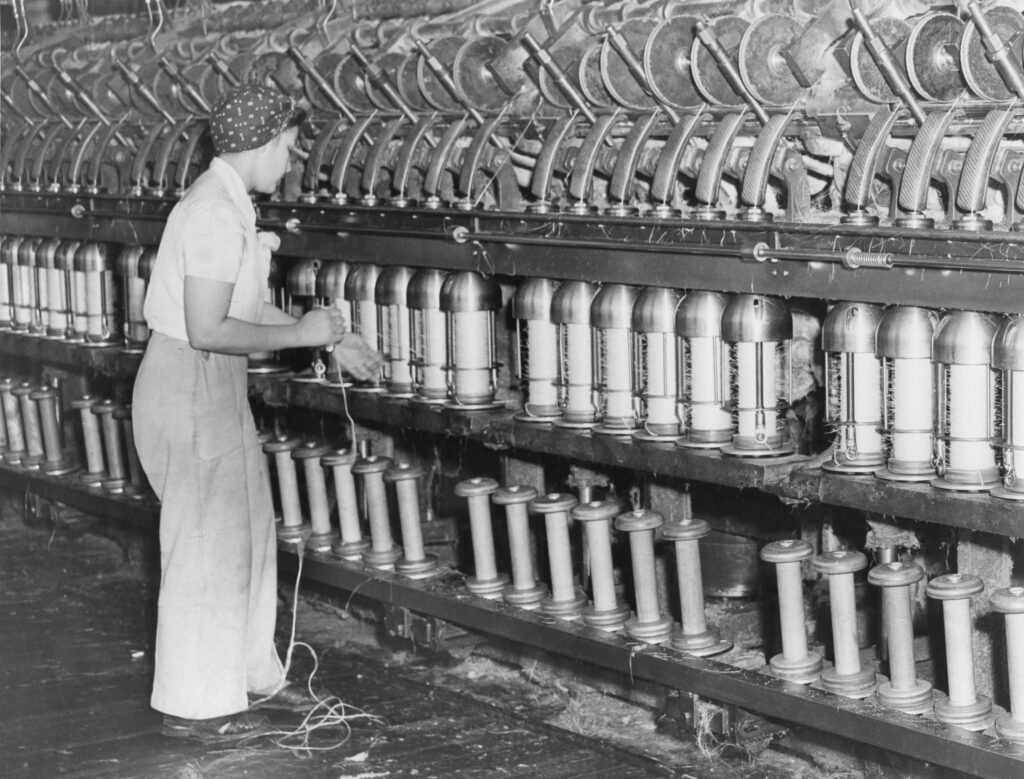
To learn more, visit the Cordage Museum.


